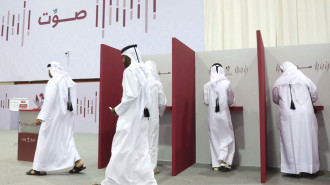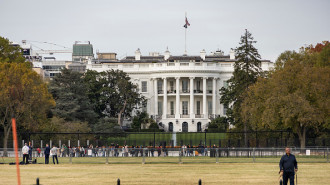'No place for the poor': Egypt's train crashes shed light on 'questionable' state priorities
The collision of two passenger trains in northern Egypt last weekend she light on the notorious record of deadly railroad incidents witnessed in the Arab World's most populous country over decades.
While the recent incident is still under investigation, concerns grew over the sector's deteriorating conditions and the government's expenditure priorities.
For decades, successive Egyptian governments argued that the country's railways had been sustaining financial losses, which made them reluctant to invest in the sector.
In May 2017, President Abdel Fattah al-Sisi said he would refrain from upgrading the sector. "Instead of investing [for example] 10 billion in upgrading railways, I'd rather deposit this money in a bank and get an interest of one billion [a year]," he said, during a televised public event, while also calling for an increase in the price of train tickets.
Almost three months later, a horrendous train collision took place near the Mediterranean city of Alexandria, leaving over 40 dead and more than 130 others injured, many seriously, sparking a public outcry, and prompting the government to retract its earlier stance.
The railway was initially introduced to Egypt in 1851 during the reign of Khedive Abbas I, making the country the first in the region and the world's second after the UK to have the service. It is believed that much of the sector's infrastructure is owed to that era.
"It may seem on the surface that the government attempted to upgrade the rail sector by introducing state-of-the-art and air-conditioned trains. But mediocre services provided to ordinary Egyptians who cannot afford the tickets of such facilities remain neglected," a source inside the now-frozen parallel railway workers' syndicate said.
"The Egyptian Railway Authority has deliberately overlooked hundreds of old trains used by the poor. What proves my point is that almost all trains involved in crashes and collisions have proved to be worn out and long outdated," the source told The New Arab, on condition of anonymity for security reasons.
"No proper technical support or maintenance has been carried out on these trains for years, which are, nevertheless, still operational," he added.
Another rail worker, who also requested to remain anonymous for similar reasons, agreed with his colleague.
"The authority has [reportedly] been ignoring the workers’ complaints about the declining conditions of train tracks, cars and communication devices that have been frequently malfunctioning," he noted.
"Only God saves the livers of thousands of passengers and workers riding those trains every day from deadly threats," the worker told TNA.
"We are the ones paying dearly for the [alleged] corruption and neglect of government officials, commonly pinning any incident on workers, drivers and engineers, while ignoring other technical factors and their failure to fulfil their duties," the worker said with a sigh.
In recent years, the recurrence of railway tragedies led many Egyptians to blame Minister of Trasport Kamel El-Wazir for the deteriorating conditions of the sector in the country, calling on him to step down.
Nevertheless, in July this year, Wazir, a former senior military officer known for his loyalty to President Abdel Fattah al-Sisi, assumed additional roles as a Minister of Industry and a Deputy Prime Minister against all the odds.
Scapegoating culture
Last week's collision in Zagazig, the capital city of Sharqiya province, resulting in the death of four and the injury of nearly 50 others, has, arguably, echoed a culture of official denial and scapegoating.
During an interview with eXtra News shortly after the incident, Wazir denied the incident may have resulted from possible technical glitches, blaming it on what he described as "a human error" as he inspected the scene, without elaborating further.
Perhaps the most horrific train incident in Egypt's modern history took place in February 2002 when 361 passengers, mostly poor Egyptians, were burned alive.
Dubbed "the Southern Egypt train incident," a train carrying its double capacity caught fire as passengers failed to escape the trucks in flames.
Like the case with this month's collision, then-Prime Minister Atef Ebeid in statements on the scene to reporters denied any negligence, lack of safety precautions or technical deficiencies before an initial investigation had been conducted.
11 senior railway authority officials stood trial but were later acquitted due to insufficient evidence. The transport minister and the head of the railway authority resigned to save face.
Yet, 22 years on, no single official has been legally held accountable for the loss of lives that day.
'No place for the poor'
The frequency of such incidents led activists and government critics to question the value of multi-billion-dollar megaprojects mostly targeting rich and upper-middle social classes in a country whose nearly one-third of the over 106-million-population is under the poverty line and already hit hard by an economic crisis.
Sisi has repeatedly defended his controversial policies of launching lavish projects as being essential to the country’s development, urging Egyptians to endure economic difficulties.
One project is the Cairo Monorail, which extends across 35 stations along 96 kilometres, linking Cairo to Giza provinces, costing taxpayers around $US 5 billion. Expected to be the world's longest driverless monorail network, it is believed to have added to the financially overburdened North African country.
Another controversial project is the high-speed electric train, whose pilot launch is due in the first quarter of 2026. The electric rail line will run from the Red Sea resort of Ain Sokhna to New Alamein—lying on the coast of the Mediterranean Sea—and passing through the New Administrative Capital, east of Cairo.
"The traditional railway network is a major means of travel for millions of Egyptians. But the recent questionable priorities of the government reflect a kind of social discrimination due to the attention given to extravagant means of transportation and travel expected to be out of the reach of ordinary citizens," a high-profile political activist, who asked to be unnamed for safety concerns, told TNA.
"It is as if in Sisi's 'New Republic,' there is no place for the poor," the activist concluded.
![While the Sharqia train collision incident is under investigation, concerns have grown over the railway safety in Egypt. [Getty]](/sites/default/files/styles/large_16_9/public/2171231173.jpeg?h=a5f2f23a&itok=PyZkanUn)




 Follow the Middle East's top stories in English at The New Arab on Google News
Follow the Middle East's top stories in English at The New Arab on Google News


